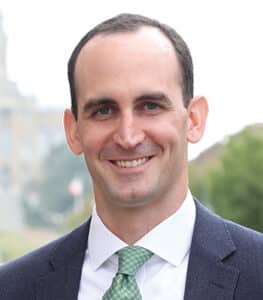Business Record asks advocacy leaders what policies are on their radar for the 2025 Iowa legislative session

Mike Mendenhall Jan 10, 2025 | 6:00 am
6 min read time
1,517 wordsBusiness Record Insider, Government Policy and LawAs state lawmakers convene at the state Capitol, the Business Record will sit down with business and nonprofit advocacy leaders on Jan. 14 for our annual virtual Legislative Forecast event to learn what issues they think will define the 2025 Iowa legislative session for the business community.
We will discuss efforts to reduce and reform property taxes, the goals of the new higher education committee in the Iowa House, increasing child care access and the outlook for legislation addressing housing affordability, population growth, workforce retention, skilled training and the state’s worker shortage.
Panelists will include:
- JD Davis, vice president of public policy, Iowa Association of Business and Industry
- Ryan Moon, director of government relations and public policy, Greater Des Moines Partnership
- Joe Murphy, president, Iowa Business Council
- Mollie Ross, vice president of operations, Technology Association of Iowa
- Dave Stone, advocacy officer, United Way of Central Iowa
In advance of the event, the Business Record reached out to our five panelists to ask about the top issues they’ll be watching this session, as well as their predictions on other policies that could find their way to the Iowa House and Senate floors after the session is gaveled in Jan. 13.
Answers have been lightly edited for clarity and brevity.
What are the top legislative priorities your organization will support and/or monitor during the 2025 Iowa legislative session, and why could they be significant to Iowa businesses?

Davis: Several ABI committees, made up of members with specific issue-area expertise and the ABI board of directors, meet throughout the year to establish priorities for the coming year. For 2025 ABI will be focusing on tax policy, workforce issues and regulatory reform.
On taxes, policymakers have transformed Iowa’s income tax climate by replacing a high, graduated income tax for individuals and businesses with a low, flat tax that will stimulate growth and make Iowa a preferred location for business expansion. Not unlike residential property taxpayers, commercial and industrial property taxpayers are now pointing out the Iowa property tax system for a similar review and overhaul. Recent property tax legislation has had broad bipartisan support, and ABI hopes to work with all interests to reform the system of funding local governments that captures the same pro-growth aspects that were captured by the income tax overhaul.

Moon: Through our collaborative work with Partnership investors and member businesses and organizations, we are highlighting the following featured priorities for the 2025 Iowa legislative session:
- Economic growth
- Workforce readiness
- Housing
- Quality of life
These priorities align with our mission as an economic development and community development organization, and we will focus on working with our elected officials on actionable steps to advance these priorities. In alignment with these priorities, we will be following opportunities that support a competitive tax environment that promotes business growth, as well as talent attraction and retention initiatives, including work-based learning, to grow and expand the region’s workforce.

Murphy: The availability of a talented pipeline is critical for long-term economic prosperity in Iowa. The IBC will continue to advocate for initiatives that grow Iowa’s workforce, including work-based learning programs, child care and housing for all. The IBC will also continue its support for Iowa’s mental health systems. By partnering with a broad coalition of stakeholders, the IBC will work toward increasing the supply of mental health professionals while also exploring increasing public funding mechanisms. The IBC will also focus on maximizing the recent efforts to make Iowa’s holistic tax system more competitive for individuals and businesses, including property tax and unemployment insurance tax.

Ross: TAI’s legislative priorities for 2025 focus on advancing technology-driven growth and workforce development to position Iowa as a leader in innovation. Key areas of focus include artificial intelligence, cybersecurity, connectivity and workforce development — issues critical to equipping Iowa businesses with skilled talent, secure operations and access to a thriving digital economy. These priorities aim to create an environment where technology-driven enterprises can grow and succeed, driving economic opportunities across the state.

Stone: United Way of Central Iowa will continue to focus on the child care workforce to help expand access to affordable, quality early-learning experiences. We will also be supporting advancing housing stability and economic opportunity while strengthening the food security system and access to nutrition.
The 2024 session saw the passage of the Major Economic Growth Attraction (MEGA) program meant to lure $1 billion in business investment to Iowa. This was seen as a win for companies, including manufacturers, looking to expand in or move into the state. With Iowa’s manufacturers experiencing economic headwinds, what might the Legislature do in 2025 that could bolster that sector?
Davis: ABI was an early and strong supporter of the Major Economic Growth Attraction (MEGA) legislation. The program truly is transformational. It is more than an incentive program for one or two qualifying awardees. The scale of the projects that will qualify guarantee that the program will create a surge in supply chain manufacturing, workforce development and a measurable uptick in statewide economic activity. With the passage of the bill, Iowa can compete with any locale for these economy-changing projects.
As to headwinds, or tailwinds, for that matter, Iowa will always be somewhere on a continuum of expansion and contraction. The most recent quarterly business survey of ABI members indicates that Iowa businesses are poised to increase capital expenditures in the first quarter of 2025, suggesting these businesses are poised for growth. The impact of sound state fiscal policy combined with pro-growth tax policy is most certainly a contributing factor that has ABI members leaning in on growth, while other parts of the nation may be lagging. In 2025, the governor and the Legislature can continue to send signals for growth to Iowa businesses by sticking to their pro-growth principles in policy development.
The Iowa Business Council and its members have consistently advocated for what they consider a competitive tax code to support business. As Gov. Kim Reynolds and the Republican legislative majority look to reform Iowa’s property tax code in 2025, what does IBC think should be included in any proposed legislation? What should be considered in terms of commercial property taxes?
Murphy: Property tax rates for Iowans, both on the commercial side and the residential side, need to be more competitive. Iowa currently ranks 32nd in property tax competitiveness. Long term, achieving a top 15 ranking in property tax, corporate income tax and individual income tax will set the stage for new innovations and opportunities.
What aspect of affordable, workforce and overall housing inventory do you expect the Legislature to take on in the upcoming session? What do developers, brokers and lenders need to know about what could be up for debate at the Capitol this year?
Moon: Housing is a topic that continues to come up in conversations with rural, suburban and urban communities. We remain committed to supporting programs and creative solutions that expand housing options by leveraging funding and policies to support communities, developers and employers to invest in both new and existing housing for all Iowans. Specifically, we will continue to advocate for increased investment in the State Housing Trust Fund, the Workforce Housing Tax Credit program and down payment assistance programs.
In 2024, a list of legislation related to artificial intelligence’s possible role in emergency management communications, administrative rule review and elections failed to gain support in the Legislature, but funding was allocated to Iowa State University to address workforce needs in multiple areas that included AI. What is TAI’s hope for AI legislation in 2025, and how could the state government become a leader in the AI space?
Ross: In 2025 TAI looks forward to legislative advancements that position Iowa as a leader in AI innovation, education and adoption. We support policies that encourage safe and ethical AI development while fostering its responsible use across industries. Education and workforce initiatives are essential to ensuring Iowa’s workforce is prepared for an AI-driven economy, and collaboration between academic and private sectors can help unlock practical AI applications in areas like emergency management and public services.
By embracing a forward-thinking and collaborative approach to AI policy, Iowa can strengthen its leadership in this transformative field. Supporting ethical research, funding pilot projects to showcase AI’s potential for improving government efficiency, and creating platforms for public-private partnerships will highlight Iowa as a state committed to responsible and impactful AI integration.
Access to affordable child care has for years been considered a workforce issue for Central Iowa businesses. What could be proposed during the 2025 session to address this issue and what is the current state of child care access in the state?
Stone: One of the critical barriers for child care is the workforce. We will be advocating for additional supports for providers such as extending the Child Care Assistance pilot for providers, potential tax credits or exemptions, and property tax rates for child care centers. For families, recent changes to the CCA program’s weekly work/education requirement to 32 hours a week has prevented many families from accessing benefits. We will be advocating for increased flexibility in those requirements.

Mike Mendenhall
Mike Mendenhall is associate editor at Business Record. He covers economic development, government policy and law.











